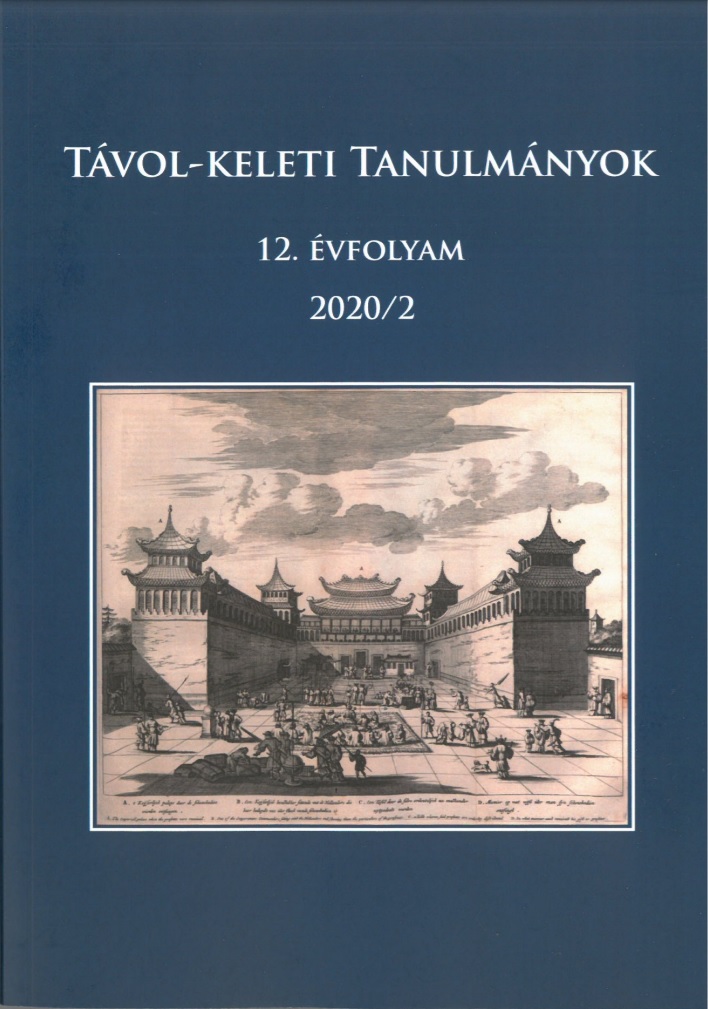Motisták és konfuciánusok vitatémái az ókori Kínában II.: Motista kritikák a konfuciánusokkal szemben
Megjelent 2021-07-12
Kulcsszavak
- motizmus,
- konfucianizmus,
- bölcseleti vita,
- elrendelés,
- szellemek létezése
Hogyan kell idézni
Copyright (c) 2021 a szerző(k)

This work is licensed under a Creative Commons Attribution-NonCommercial 4.0 International License.
Absztrakt
A kínai filozófiatörténetben közismert ténynek számít, hogy az i. e. 5–4. században a konfuciánusok és a motisták szemben álltak egymással. A két irányzat képviselőinek disputáiról összesen három típusú forrás tudósít bennünket: 1. A külső források, amelyek a két irányzat vitáiról külső szemlélőként tudósítanak. 2. A konfuciánus források, amelyek leginkább a motizmussal szembeni konfuciánus kritikákat tartalmazzák; 3. A motista források, amelyek pedig elsősorban a konfuciánus nézetek motista kritikáit részletezik. Ezen tanulmány előzményében az első és a második kategóriát vizsgáltam, jelen tanulmányban pedig a harmadik csoportra fókuszálok.
Hivatkozások
- Lunheng 論衡: Cai Zhenchu 蔡鎮楚 (komm.) 2012. Xinyi Lunheng duben 新譯論衡讀 本. I-II. Taibei: Sanmin shuju.
- Lunyu 論語: Yang Bojun 杨伯峻 (komm.) 1980. Lunyu yizhu 論語譯注. Beijing: Zhonghua shuju.
- Mozi 墨子: Johnston 2010.
- Brindley, Erica Fox 2010. Individualism in Early China: Human Agency and the Self in Thought and Politics. Honolulu: University of Hawai‘i Press.
- Brown, Miranda 2007. The Politics of Mourning in Early China. Albany, NY: SUNY Press.
- Carr, Michael 1992. „Shamanic Heng 恆, ‘Constancy’.” Otaru Shōka Daigaku jinbun kenkyū 小樽商科大学人文研究 83: 93–159.
- Chen Ning 2003. Mohist, Daoist, and Confucian explanations of Confucius’s suffering in Chen-Cai.” Monumenta Serica 51: 37–54.
- Chen Zhi 陳致 2008. „Wan wu yu Yong zou: Shangdai jisi yuewu yu Shijing zhong de san song 萬舞與庸奏: 商代祭祀樂舞與詩經中的三頌 [A Wan tánc és a Yong zenei előadás: Áldozati zene és tánc a Shang-dinasztia idején és a Dalok könyvének három dicshimnusza].” Zhonghua wenshi luncong 中华文史论丛 2008/4: 35–63.
- Csikszentmihalyi, Mark 2004. Material Virtue: Ethics and the Body in Early China. (Sinica Leidensia) Leiden: Brill.
- Ding Sixin 2011. „A Study on the Dating of the Mozi Dialogues and the Mohist View of Ghosts and Spirits.” Contemporary Chinese Thought 42/4: 39–87.
- Fingarette, Herbert 1972. Confucius: The Secular as Sacred. New York: Harper and Low.
- Fraser, Chris 2013. „The Ethics of the Mohist Dialogues.” In: Carine Defoort and Nicolas Standaert (eds.): The Mozi as an Evolving Text: Different Voices in Early Chinese Thought. (Studies in the History of Chinese Texts, vol. 4. ) Leiden: E. J. Brill, 175–204.
- Gibas, Piotr 2017. „Mozi and the Ghosts: The Concept of Ming 明in Mozi’s “Ming gui” 《明鬼》.” Early China 40: 89–123.
- Hsiao, Kung-chuan 1979. A History of Chinese Political Thought, vol. 1: From the Beginnings to the Sixth Century A.D. [Trans. F W. Mote] Princeton: Princeton University Press.
- Johnston, Ian 2010. The Mozi: A Complete Translation. Hong Kong: The Chinese University Press.
- Kern, Martin 2017. „Language and the Ideology of Kingship in the “Canon of Yao”.” In: Yuri Pines – Paul R. Goldin – Martin Kern (eds.): Ideology of Power and Power of Ideology in Early China. Leiden: Brill, 23–61.
- Knoblock, John 1988. Xunzi: A Translation and Study of the Complete Works. Vol. I. Books 1–6. Stanford: Standford University Press.
- Kósa Gábor 2019. „Kultúrhéroszok vagy hivatalnokok? Feltaláló-listák a Lüshi chunqiu 17. könyvében.” Távol-keleti Tanulmányok 9/1: 33–61.
- Kósa Gábor 2020. „Motisták és konfuciánusok vitatémái az ókori Kínában I. Konfuciánus kritika a motistákkal szemben.” Távol-keleti Tanulmányok 12/1: 5–31.
- Lai, Whalen 1993. „The public good that does the public good: A new reading of Mohism.” Asian Philosophy: An International Journal of the Philosophical Traditions of the East 3/2: 125–141.
- Nylan, Michael 2009. „Kongzi and Mozi, the Classicists (Ru 儒) and the Mohists (Mo 墨) in Classical-Era Thinking.” Oriens Extremus 48: 1–20.
- Perkins, Franklin 2008. „The Moist Criticism of the Confucian Use of Fate.” Journal of Chinese Philosophy 35/3: 421–436.
- Smith, Kidder 2003. „Sima Tan and the Invention of Daoism, “Legalism,” et cetera.” The Journal of Asian Studies 62/1: 129–156.
- Sterckx, Roel 2013. „Mozi 31: Explaining Ghosts, Again.” In: Carine Defoort – Nicolas Standaert (eds.): The Mozi as an Evolving Text: Different Voices in Early Chinese Thought. (Studies in the History of Chinese Texts, vol. 4. ) Leiden: E. J. Brill, 95–141.
- Tőkei Ferenc 2005a. Kínai filozófia – Ókor I. Budapest: Magiszter Társadalomtudományi Alapítvány.
- Tőkei Ferenc 2005b. Kínai filozófia – Ókor II. Budapest: Magiszter Társadalomtudományi Alapítvány.
- Tőkei Ferenc 2005c. Kínai filozófia – Ókor III. Budapest: Magiszter Társadalomtudományi Alapítvány.
- Van Norden, Bryan W. 2007. „Mozi and Early Mohism.” In: Virtue Ethics and Consequentialism in Early Chinese Philosophy. Cambridge: Cambridge University Press, 139–198.
- Vorenkamp, Dirck 1992. „Another look at utilitarism in Mo-tzu’s thought.” Journal of Chinese Philosophy 19/4: 423–443.

